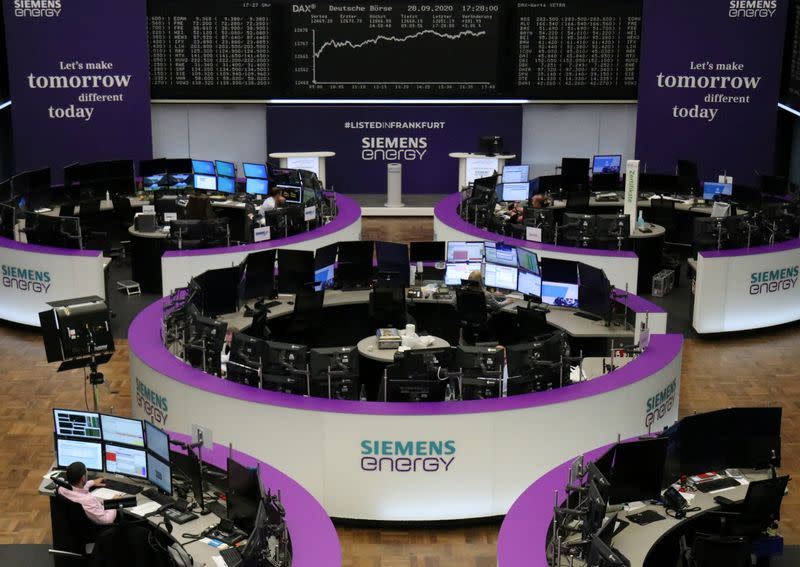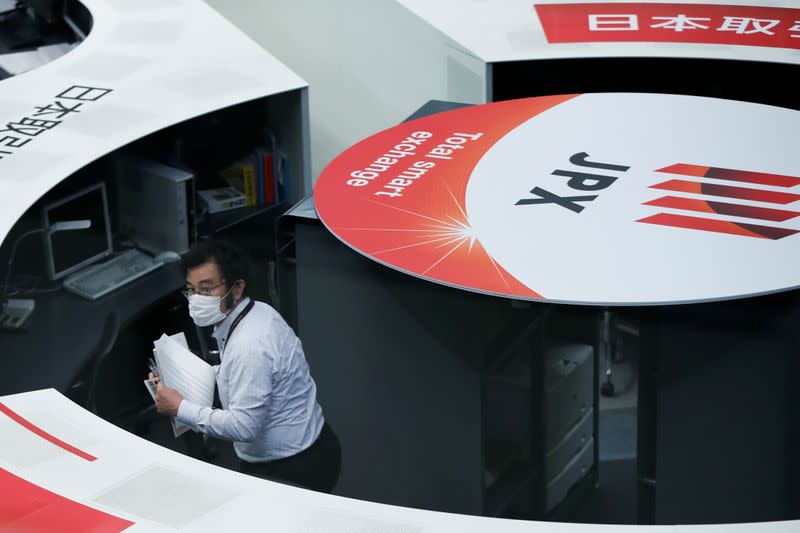Vaccine hopes drive stocks higher on 'Black Monday' anniversary
By Matt Scuffham and Thyagaraju Adinarayan
NEW YORK/LONDON (Reuters) - Wall Street opened higher and the dollar slipped on Monday as rising hopes of a coronavirus vaccine by the end of the year and a U.S. fiscal package before the election offset concern over record daily infections in Europe.
U.S. stocks rose in early trading, on the 33rd anniversary of the 1987 "Black Monday" crash, when the Dow Jones Industrial Average lost 22.6% in one day, equivalent to a drop of about 6,500 points in the index today.
Worries about a second wave of coronavirus infections and no breakthrough in the Brexit stalemate failed to curb risk appetite among investors, after U.S. House Speaker Nancy Pelosi said on Sunday she was optimistic about a coronavirus relief deal before Election Day.
Boosting overall sentiment, drugmaker Pfizer Inc said on Friday it could have a coronavirus vaccine ready in the United States by the end of this year.
Adding to optimism, China's economic recovery accelerated in the third quarter as consumers shook off their coronavirus caution, although the weaker-than-expected headline growth capped stock market gains in Asia.
"I think there is a heady cocktail of vaccine optimism, good Asian data and a lack of full scale lockdowns which is helping the sentiment," said John Woolfitt, director of trading at Atlantic Capital Markets.
The Dow Jones Industrial Average rose 27.24 points, or 0.10%, at the open to 28,633.55. The S&P 500 opened higher by 9.85 points, or 0.28%, at 3,493.66, while the Nasdaq Composite gained 60.78 points, or 0.52%, to 11,732.34 at the opening bell.
The European blue-chip stocks index was slightly positive even as new COVID-19 cases were growing at a record 150,000 a day in Europe. Parts of the UK were put into lockdown and France imposed curfews.
Trading volumes in Europe were however sharply lower due to a technical glitch at exchange operator Euronext, which led to trading activity being halted in the Amsterdam, Brussels, Lisbon and Paris bourses.
Investors took comfort from China's economic recovery in the third quarter as consumers shook off their coronavirus caution,
MSCI's broadest index of Asia-Pacific shares outside Japan rose 0.5% for a second straight day of gains, paring back following third-quarter gross domestic product data from China.
Monthly indicators pointed to an expansion in economic activity in China. Industrial output accelerated 6.9% in September from a year earlier, when analysts were looking for a 5.8% gain from a 5.6% rise in August.
In currency markets, the yuan soaring to a fresh 1-1/2-year high against the dollar, while the U.S. dollar slipped 0.4% to 93.295 against a basket of six major currencies.
The Chinese currency touched 6.6737 against the U.S. dollar in the offshore market, its strongest since March 2019. It was last up 0.4%.
The euro meanwhile traded 0.3% higher at $1.1756 and sterling rallied back to near $1.30 levels against the dollar on Monday. Investors cut their holdings as British and European negotiators tried to salvage post-Brexit trade talks. "EU-UK trade talks are flirting with collapse," ANZ economists said. "UK Prime Minister Johnson said the UK needs to prepare for a no-deal outcome, as both sides cannot agree on a Canada-style FTA. Talks resume in London on Monday, but without the political willingness to shift ground, there is little the negotiators can achieve."
Gold gained ground as the dollar slipped. Spot gold added 0.56% to $1909.51 an ounce.
(Additional reporting by Swati Pandey in Sydney, editing by Larry King, Raissa Kasolowsky and Chizu Nomiyama)


